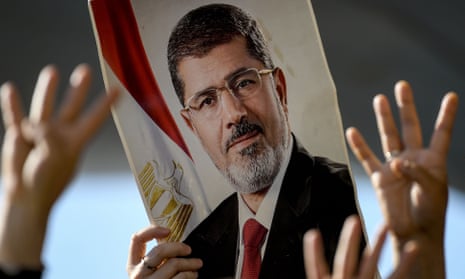Real-life events can bear a remarkable symbolic power. The advent of Egypt’s first and only democratically elected president in 2012 was one of them. His collapse, in a courtroom “cage” on Monday, after years of inadequate medical care, is another. Egyptians who would otherwise shed no tears for Mohamed Morsi can still regret the nature of his passing and what it says about their stolen revolution. He helped to destroy their hopes. The man who ousted him has done worse.
The Muslim Brotherhood’s candidate swept to power, after protests ended Hosni Mubarak’s three-decade rule in the Arab spring. But secular and liberal voters who lent the Islamist movement their votes to beat a Mubarak-regime rival were angered and frightened by Morsi’s own authoritarian bent. Many were sympathetic when his defence minister, General Abdel Fatah el-Sisi, led a coup, amid mass protests against the president. John Kerry, then US secretary of state, even claimed that the army “were restoring democracy”.
Instead, they restored military rule, oversaw the massacre of hundreds of Morsi’s supporters at Rabaa, and have imposed a far more brutal regime. Last year Mr Sisi won an election in which every credible rival was excluded; this year he triumphed in a similarly dodgy referendum on sweeping constitutional changes that could see him ruling until 2030. Hundreds of Muslim Brotherhood supporters who protested against the coup have been sentenced to death in mass trials, while no member of the security forces has even faced a court over the deaths at Rabaa. A few months ago Cairo executed men who protested that they had been tortured into “confessions” of assassinating an official.
What makes Morsi’s death truly shocking is that, although sudden, it was “entirely predictable – and we predicted it”, in the words of Sir Crispin Blunt. He was one of the UK parliamentarians who investigated Morsi’s treatment last year, at the request of his family. The resulting report warned, as other people had, that the conditions in which he was being held might amount to torture, and that without urgent medical assistance for his diabetes and liver disease, the damage to his health could be “permanent and possibly terminal”. At one point, he reportedly slipped into a diabetic coma while in custody.
Unfair trials and cruel treatment are standard for Egypt’s estimated 60,000 political prisoners. Morsi was reportedly kept in solitary confinement for 23 hours a day and denied access to newspapers or television. He saw his family just three times in almost six years of detention. Despite his ill health, he told them that he slept on the floor of his cell.
The United Nations office for human rights has led demands for a “prompt, impartial, thorough and transparent investigation”. The manner of the rushed burial has already raised questions. One can imagine how much cooperation an inquiry is likely to receive from a secretive and thuggish regime. Nonetheless, the demand should be made, not only because the facts matter, but because of the message it sends to western democracies determined to pursue what the UK calls a “constructive relationship” with Egypt. France and others wrongly see Mr Sisi as a force for stability in the region, and a handy obstacle to the flow of migrants, as well as a customer for arms sales.
Morsi played his part in wrecking Egypt’s hopes. Nonetheless, his suffering and death stand for the ordeal of tens of thousands of political prisoners, and for the regime’s determination to crush opposition. It should shame General Sisi’s friends into acknowledging the truth.
